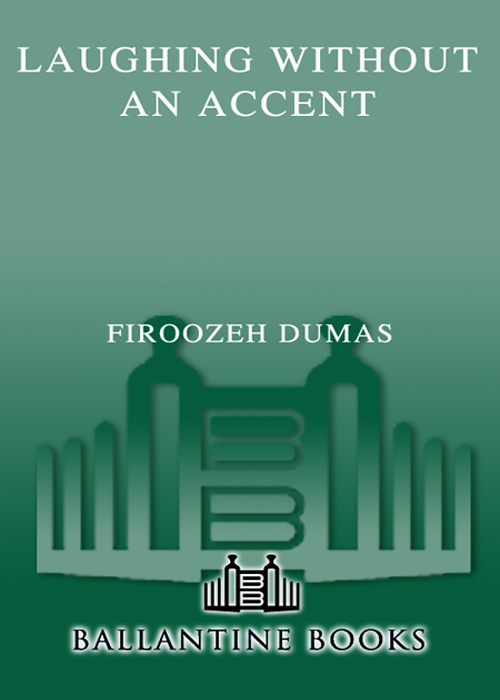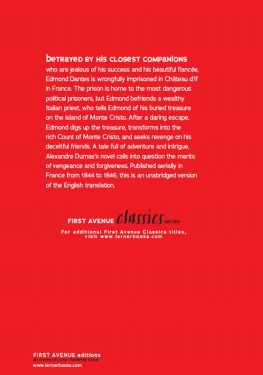Firoozeh Dumas - Laughing without an accent: adventures of an Iranian American, at home and abroad
Here you can read online Firoozeh Dumas - Laughing without an accent: adventures of an Iranian American, at home and abroad full text of the book (entire story) in english for free. Download pdf and epub, get meaning, cover and reviews about this ebook. year: 2008, publisher: Villard, genre: Detective and thriller. Description of the work, (preface) as well as reviews are available. Best literature library LitArk.com created for fans of good reading and offers a wide selection of genres:
Romance novel
Science fiction
Adventure
Detective
Science
History
Home and family
Prose
Art
Politics
Computer
Non-fiction
Religion
Business
Children
Humor
Choose a favorite category and find really read worthwhile books. Enjoy immersion in the world of imagination, feel the emotions of the characters or learn something new for yourself, make an fascinating discovery.

- Book:Laughing without an accent: adventures of an Iranian American, at home and abroad
- Author:
- Publisher:Villard
- Genre:
- Year:2008
- Rating:4 / 5
- Favourites:Add to favourites
- Your mark:
- 80
- 1
- 2
- 3
- 4
- 5
Laughing without an accent: adventures of an Iranian American, at home and abroad: summary, description and annotation
We offer to read an annotation, description, summary or preface (depends on what the author of the book "Laughing without an accent: adventures of an Iranian American, at home and abroad" wrote himself). If you haven't found the necessary information about the book — write in the comments, we will try to find it.
Firoozeh Dumas: author's other books
Who wrote Laughing without an accent: adventures of an Iranian American, at home and abroad? Find out the surname, the name of the author of the book and a list of all author's works by series.
Laughing without an accent: adventures of an Iranian American, at home and abroad — read online for free the complete book (whole text) full work
Below is the text of the book, divided by pages. System saving the place of the last page read, allows you to conveniently read the book "Laughing without an accent: adventures of an Iranian American, at home and abroad" online for free, without having to search again every time where you left off. Put a bookmark, and you can go to the page where you finished reading at any time.
Font size:
Interval:
Bookmark:



CONTENTS
To the Frenchman
Funny in Persian

I ran does not currently adhere to international copyright laws. This comes as a shock to most people, given Irans lawabiding image.
Not adhering to international copyright laws means that any book, regardless of origin, can be translated into Persian and sold in Iran. No matter how poorly a book might be translated, the author has no control. No artist wants his name on a work that does not represent him fairly, but in Iran, tell it to the judge, and he doesnt care. When Abbas Milani, a very well respected author and professor, found a Persian translation of his history book, he found it to be completely different from the original. He contacted the publisher in Iran, who told him, Our translation is better than your book.
Every time a Harry Potter installment is released, there is a mad rush around the world to translate the book. One Iranian publisher divides each book into about twenty sections, giving each section to a different translator. That way, his version, which must resemble a patchwork quilt more than anything J. K. Rowling actually wrote, is the first on the Iranian market.
Knowing such horror stories, I feared the inevitable translation of my memoirs, Funny in Farsi, into Persian. Funny in Farsi is a collection of humorous vignettes, verbal snapshots of my immigrant family. In that book I was very careful not to cross the line into anything embarrassing or insulting. My goal was to have the subjects of my story laugh with me, not cringe and want to move to Switzerland under assumed names. But for all I knew, a translated version might make my family look like fools. Even though I had not used my maiden name in the original printing of the book, it took about twelve minutes for the average Iranian to figure out my last name, Jazayeri. Iranians are very good that way.
I decided to make my own preemptive strike and find a translator in Iran. This was not as easy as it sounds. Humor, like poetry, is culture-specific and does not always work in translation. Whats downright hilarious in one culture may draw blank stares in another.
When we came to America, my family could not figure out why a pie thrown in someones face was funny. The laugh tracks told us it was supposed to be hilarious, but we thought it was obnoxious. We also saw it as a terrible waste of food, a real no-no for anyone from any country in the world except for the United States.
We were also baffled by Carol Burnetts Tarzan yell. Anyone who watched her show regularly knew that during the audience question-and-answer section, one person would inevitably ask her to do her Tarzan yell. We always hoped she would say, Not tonight. But instead, she would let out a loud and long yell that left the audience in stitches and us bewildered. She shouldnt do that, my dad always said. We agreed and waited for all her other sketches, which we loved. There was just something goofy about her that made us laugh, especially when she was with Tim Conway. His humor had much to do with facial expressions and body language, which, thankfully, did not require translation. There is also something universally funny about the contrast between a short man and a tall man, which was played out with Harvey Korman. Given that most of the men in my family are closer in height to Tim Conway than to Harvey Korman, I assume there was among us a nervous understanding of the foibles of the short man.
We also adored Flip Wilson, especially when he became Geraldine. That character sketch, with Geraldines sassy attitude, had us rocking back and forth in laughter on our ugly brown striped sofa. One time, Flip Wilson sang He put the lime in the coconut in his high-pitched mock-sultry Geraldine voice, and my father laughed so hard that he cried. I didnt think it was that funny, but watching my father laugh made us all laugh. The odd thing is that thirty-five years later, my father still remembers some of the words to that song, singing it as Kazem imitating Flip Wilson imitating Geraldine. It sounds nothing like the original, especially when he ekes out a nee nee nee nee instead of the forgotten lyrics.
I knew that Funny in Farsi would be a difficult book to translate because so much of its humor has to do with the American culture of the seventies. How does one translate Shake n Bake for cultures where slow cooking, not speed and ease, is the preferred method of food preparation, where a woman standing in her kitchen shaking a drumstick in a plastic bag and looking downright happy would cause concern? How does one convey to someone who has never seen The Price Is Right that the words Come on down! are always followed by a hysterical person shrieking and jumping up and down?
Through my uncle, who knew someone who knew someone, I was put in touch with a well-known humor translator living in Iran. The same week I started corresponding with him I received a very polite e-mail from Mohammad, another translator in Iran, asking for permission to translate my book. I thanked him but told him I already had someone. I deleted his e-mail.
Before we had a chance to formally agree on anything, my designated translator became ill, and it was obvious that I would have to find someone else. I was stuck, since I had deleted Mohammads e-mail. A month later, I received another e-mail from Mohammad telling me that he was still interested should I write another book. And this is how Mohammad Soleimani Nia, my translator, came into my life.
To test Mohammads skill, I asked him to translate one of my stories. I was quite pleased with the results and knew that, serendipitously, I had stumbled upon the right person.
Then we got started. Mohammad translated story by story and e-mailed each one to me. My father and I read each one and I e-mailed back our comments, most of which had to do with nuance. My father particularly objected when Mohammad translated my fathers receding hairline to my fathers bald head. I immediately sent Mohammad an e-mail quoting my father exactly: I am not Yul Brynner! A profusely apologetic e-mail followed.
Some of Mohammads mistakes revealed what life is like in the Middle East. In one story, I mentioned eyes meeting across a room and va va va boom. This was translated as eyes meeting across a room and bombs going off. I had to explain to Mohammad that, in America, boom is love.
In a story about Christmas, I wrote about the bearded fellow coming down peoples chimneys. Mohammad translated this literally. In Iran, however, a bearded fellow coming down the chimney is not a happy thought. The idea of going to bed so a bearded man, Khomeini perhaps, can come down the chimney would not cause visions of sugarplums dancing in anyones head. Instead, one would find frantic people packing their belongings, fast.
The title also had to change. Funny in Farsi is not funny in Farsi, or rather Persian, which is the correct name of the language in English. Saying, I speak Farsi, is like saying, I speak franais. I was more than happy to let that title go since it has been the subject of many long e-mails from Iranians with far too much free time on their hands, accusing me of spreading misinformation about our vastly underappreciated culture. The language is called Persian! they tell me. I know. Please, should any reader, Iranian or otherwise, feel the urge to e-mail me with a complaint about the incorrect use of the word Farsi in the title of my previous book, please, instead, look up the words humorous alliteration.
Next pageFont size:
Interval:
Bookmark:
Similar books «Laughing without an accent: adventures of an Iranian American, at home and abroad»
Look at similar books to Laughing without an accent: adventures of an Iranian American, at home and abroad. We have selected literature similar in name and meaning in the hope of providing readers with more options to find new, interesting, not yet read works.
Discussion, reviews of the book Laughing without an accent: adventures of an Iranian American, at home and abroad and just readers' own opinions. Leave your comments, write what you think about the work, its meaning or the main characters. Specify what exactly you liked and what you didn't like, and why you think so.







